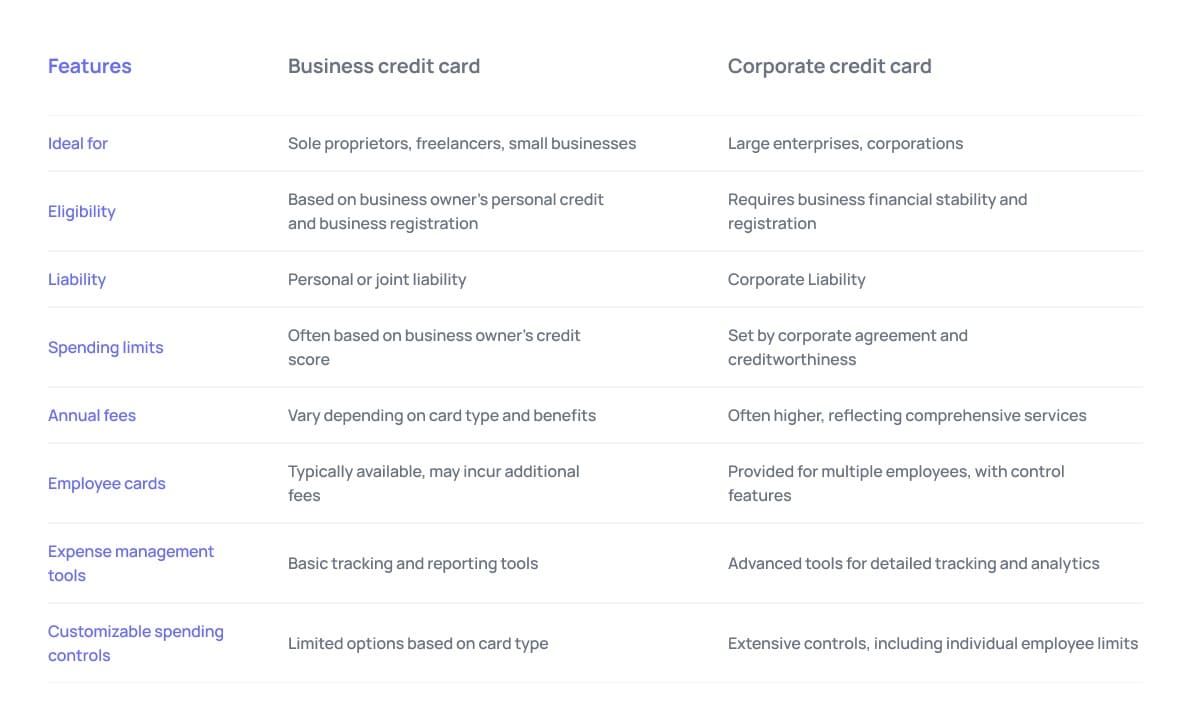Key differences between business and corporate credit cards
Both business credit cards and corporate credit cards are both great options to help your business manage its cash flow, build business credit, avail of special credit card rewards, and more.
However, a choice between the two can be a tricky one to make. Several factors such as company size, type, eligibility, expected spending, and others need to be considered. Some of these come with tools like expense management software, which can help manage corporate cards for business expenses and influence your choice.
Depending on your business’ needs and capacities, choosing between the two must only be done after forming a thorough understanding of the fundamental differences between the two.
What are business credit cards?
Cards that owners and particular employees use to manage and pay for business expenditures like bills, supplies, travel, etc. are called business credit cards. Like personal credit cards, these cards also come with benefits, perks, and cashbacks.
The rewards that business credit cards come with, however, are usually also larger and more lucrative because of the simple fact that companies spend more.

What are corporate credit cards?
Corporate credit cards are used by businesses with bigger spending requirements than those using business credit cards. These companies usually need to have high annual revenue levels that range around the $4 million mark.
The company is also often required to have a minimum number of cardholders for it to be eligible to hold corporate credit cards. This is because these cards also allow more holders than business credit cards.

Who should apply for business credit cards?
Choosing a suitable card for your business can be complicated, specifically when you’re comparing corporate credit card vs business credit card. Business credit cards are useful for a wide range of users, specifically catering to sole proprietors, freelancers, small business owners, and startups.
Business credit cards provide practical solutions to keep business and personal expenses distinct, simplifying bookkeeping and financial management.
By using a business credit card you can seamlessly manage cash flow by utilizing a line of credit for business-related purchases, which can help with some cash flow during the first few months of business setup. Business credit cards also help build credit, which is important for future financing opportunities.
Who should apply for corporate credit cards?
While choosing an ideal card for your business it's important to know the difference between corporate card and business card so that you can choose the right card based on your business requirements.
Corporate credit cards are ideal for larger enterprises and organizations with multiple employees who regularly make business-related purchases. Companies that issue corporate credit cards to employees often benefit from streamlined expense management and greater control over business spending.
These cards work well for companies that are financially stable, as the corporate card application process often requires financial records. Implementing corporate credit card program can be especially advantageous for businesses that need robust management tools.
They provide services like centralized billing and comprehensive reporting, which help in overseeing and managing employee expenses. The best corporate credit cards come with advanced security features that safeguard against fraud and unauthorized transactions making them a secure option for businesses.
Make secure and convenient business payments with corporate cards
Business credit card vs corporate credit card
Comparing corporate credit card vs business credit card can be a difficult task. You can choose between a corporate credit card and a business credit card based on your business requirements.
If you are a sole proprietor, freelancer, or small business owner it's ideal for you to opt for a business credit card but if you are managing a larger enterprise or company, a corporate credit card could be best for you.

Advantages of using business credit cards
Having a business credit card allows you to build a credit history for your business separate from personal finances. It comes with advantages such as management of cash flow, effective expense tracking, and fraud protection.
While comparing corporate credit card vs business credit card, business cards cater specifically to small businesses and startups, providing tailored rewards and features.
Credit building
A business credit card allows you to build a credit profile for your business by keeping personal credit separate from business. This difference is necessary as it allows your business to stand financially independent.
This card helps build credit history because when you use a business credit card for business expenses and pay it off regularly, you can create a record of responsible credit use. This history is essential as it shows lenders that your business can handle debt responsibly.
Improved cash flow management
Using a business credit card can enhance the management of cash flow. By utilizing a business credit card you can handle expenses, like buying inventory, paying salaries, or covering utilities without facing any delays. This approach helps maintain your business operations.
Business credit cards offer a revolving line of credit allowing you to borrow funds up to a specified limit and repay them gradually. Alternatively, a business charge card might be preferred for businesses that aim to pay off balances in full each month, offering robust spending power without accumulating interest.
Access travel and purchase protections
Business credit cards offer access to travel and purchase safeguards. Many business credit cards include travel insurance as a bonus, providing coverage for trip disruptions, lost baggage, travel delays, and medical emergencies during travels. This feature helps protect your business trips and prevents expenses.
Furthermore, business credit cards commonly come with purchase protection, shielding items purchased with the card against damage or theft for a specified time frame time after the purchase. This perk offers reassurance that your business purchases are secure.
Simplified expense tracking
Business credit cards can help you with your expense management as you can seamlessly track your expenses with them. These cards are designed in a way that they automatically record every transaction, making it easy to track all business expenses. This way you won’t have to face the hassle of manually entering each data.
You can also categorize your expenses with a business credit card. This way you can understand your spending patterns and easily allocate costs to the correct budget categories.
Fraud protection
Business credit cards provide fraud protection, such as zero liability for incorrect charges and immediate alerts for any suspicious activities. Enhanced security features like EMV chip technology and virtual cards are in place to safeguard transactions.
Additionally, card issuers offer transaction monitoring and effective dispute resolution assistance. These security measures, coupled with secure access and two-factor authentication, guarantee the safety of your business funds, offering you peace of mind against potential fraudulent activities.
Business-specific features
Business credit cards come with features that are tailor-made for businesses, like increased credit limits to accommodate purchases and cash flow requirements.
They also offer rewards programs that cater to business spending areas such as office supplies, travel, and advertising. These perks assist businesses in optimizing their spending by earning points or cashback on expenses.
Moreover, business credit cards commonly come equipped with tools for managing expenses, simplifying the process of monitoring and handling company finances.
Earn rewards
Business credit cards offer rewards programs that allow you to earn points, cash back, or miles on your business purchases. These rewards can be redeemed for various benefits, including travel expenses, merchandise, or statement credits.
For example, points might be used to book flights and hotel stays, cashback can boost your account balance, and miles can be redeemed for travel-related perks. This rewards system helps you gain additional value from your everyday business spending.
If you're looking to explore more about corporate cards and other card options, such as P-cards, check out our detailed blog on P Card vs corporate card: Which is best for your business?
Advantages of using corporate credit cards
Corporate credit cards offer a range of benefits tailored to the needs of large organizations, unique benefits that set them apart from business card functionalities. These cards are designed to simplify financial management, improve security, and provide valuable tools to monitor and control expenses.
Streamlined expense management
Corporate credit cards simplify expense management and financial oversight by providing centralized billing and detailed reporting across the business.
They are structured in a way that it puts all expenditures on one account (or a centralized set of accounts) to ease the process of expense tracking.
It also makes monitoring and managing expenses more efficient. This consolidation of financial data helps to map spending trends and ensure compliance with company policies.
The collection and analysis of this data ultimately help businesses streamline budgeting and financial reporting.
Improved cash flow management
Corporate credit cards provide a financial cushion that allows businesses to manage large expenses, especially during fluctuating revenue.
They offer flexibility to make necessary purchases when cash flow is low or cover unexpected costs without immediate cash outflow.
This can help maintain business operation continuity by filling cash flow gaps and ensuring that necessary payments and expenses are met.
This is particularly important for effectively managing seasonal fluctuations and unexpected financial uncertainties.
Detailed reporting and analytics
Corporate credit cards provide valuable insights into spending through their extensive reports and analytics.
Tracking spending patterns, and knowing precisely what you are spending on, are both essential activities that are part of the cost allocation process.
Corporate credit cards allow you to see where the money is going and make better financial decisions.
Insight into spending patterns helps a business to make budgets, plan spends, and make cost-saving decisions. The analytics are beneficial in aligning spending with the company's strategic business goals.
Global acceptance and convenience
Corporate credit cards are an excellent option for businesses with frequent international transactions and operations.
These cards facilitate payment without the usually high fees on currency exchange when dealing with partners, vendors, employees, and clients worldwide.
Allowing flexibility around cards for employees also shows that the company can seamlessly conduct business in different countries.
It also creates effective avenues for business-related travel by employees, which boosts global growth, worldwide brand building, and client acquisition.
Enhanced spending controls
An advantage of corporate credit cards is that they allow companies to set spending limits for individual employees.
This way companies can seamlessly manage their expenses by setting limits on transaction amounts, as well as which merchants can be paid using corporate credit cards.
These limits can be set based on several different variables including role, project, and department.
The person setting the limits might be a manager, a director of the project, or another individual in a senior managerial position within the company.
Integration with third-party tools
Corporate credit cards and spending policies also integrate with accounting software that can further simplify the day-to-day responsibilities for the finance teams.
Once set up correctly, the cards are easily integrated into accounting software, which makes syncing with third-party tools seamless.
This integration significantly reduces errors in data entry and cuts down on time spent on repetitive manual tasks.
By connecting with third-party tools, businesses can enhance their financial oversight, improve efficiency, and maintain accurate financial records effortlessly.
Employee spending controls
Corporate cards offer customizable settings that help enforce both the company's general spending policy and its specific corporate credit card policy.
Companies can establish any restriction level on type of expenses and monitor spending in real time.
These controls help prevent unauthorized transactions, maintain spending policies, and clarify employee purchases.
By customizing the card settings for each employee and/or departmental need, the company can manage expenses effectively and reduce misuse of the cards.
Centralized billing process
Corporate credit cards simplify the payment process by combining all purchases into a centralized bill.
This consolidation of transactions reduces the administrative work, as it removes the need to manage multiple invoices or receipts, since all charges are combined into an easy-to-follow statement.
This makes the report easier to manage, track and reconcile.
This makes balancing monthly transactions easier, saving time and reducing the opportunity for error when analyzing expenses for accounting and budget purposes.
Enhanced security features
Corporate credit cards offer advanced security features that help keep your business safe.
This includes fraud detection systems and liability protection. These controls are used to monitor and report any unauthorized transactions and assist by providing real-time alerts and zero liability coverage for any unauthorized charges.
Enhanced security includes EMV chip technology, virtual cards for online purchases, and secure online account management.
These protections ensure that your business funds are secure and give you peace of mind against potential financial threats.
Be on top of your business expenses with corporate cards
Eligibility process for a business credit card
Many factors are taken into consideration during the application process to see whether your business is eligible for a business credit card. These include checking your credit score, business registration documents, income statements, revenue statements, and business bank account details.
For a better understanding, you can review the detailed description below.
Evaluation of personal credit score
When you apply for a business credit card, your personal credit score plays an important factor in the approval process.
Lenders usually examine your credit history to evaluate how reliable you are with finances and the level of risk you pose.
A good personal credit score reflects healthy financial habits, which can boost your chances of approval and may lead to favorable terms, like lower interest rates and higher credit limits.
On the flip side, a weaker credit score could lead to tighter lending conditions or rejection of the application altogether.
Provision of business registration proof
To apply for a business credit card you need to show paperwork that demonstrates your business status.
This usually involves submitting official documents, like a business license, incorporation papers, or a partnership agreement.
These documents validate the authenticity of your business entity and are crucial to the application procedure.
They assist lenders in confirming that your business is lawfully registered, operating properly, meeting standards, and establishes your business's credibility.
Verification of income and revenue
To be eligible for a business credit card, you must show an income and revenue from your business.
This includes submitting statements, tax returns, or bank records that indicate your business's profits and cash flow.
These papers assist lenders in evaluating your company's health and capacity to meet credit obligations.
Having regular and satisfactory revenue can boost your odds for approval. It potentially leads to good credit terms, like larger credit limits and lower interest rates.
Verification of business bank account
When you apply for a business credit card you might have to need to verify an active business bank account.
This is to make sure that your business has an active account for handling its money matters.
You can use bank statements or a letter from your bank as evidence.
Having a separate business bank account demonstrates financial organization and helps keep business and personal transactions apart, which is important to keep accurate financial records and managing finances effectively.
Requirement of personal guarantee
Business credit cards often ask for a guarantee, which means the cardholder agrees to be personally liable for any debt incurred on the account.
This gives the issuer the right to collect from the individual's assets if the business fails to pay back.
Small businesses or new ventures with a new credit history usually need guarantees.
Lenders take comfort in knowing that the cardholder will meet payment commitments, lowering the chances of non-payment and increasing the likelihood of approving a credit card.
Provision of Tax Identification Number (TIN)
When applying for a business credit card it's important to provide your company's Tax Identification Number (TIN) or Employer Identification Number (EIN).
These numbers are vital, for tax reasons, and verify your business's legitimacy.
The TIN or EIN is required in legal paperwork to ensure that all transactions and credit activities are recorded accurately.
Providing this information is a standard requirement, and essential for tax and regulatory compliance during the application process.
Eligibility process for a corporate credit card
When comparing corporate credit card vs. business credit card, it's necessary to understand how you can apply for a corporate card. Applying for a corporate credit card requires a thorough evaluation of the business's credibility, financial stability, and compliance with regulations. This process ensures that the company can manage and repay credit responsibly, mitigating risks for the lender.
Here are the key requirements for obtaining a corporate credit card
Proof of business registration
To be issued a corporate credit card you will need to show evidence of your business registration.
This includes submitting legal documents, like a business license, articles of incorporation, or partnership agreement.
These documents confirm the legal status and legitimacy of your business, ensuring it is officially recognized and compliant with regulations.
This step is crucial for establishing the business's credibility and eligibility for a corporate credit card.
Showing financial stability
To demonstrate financial stability, businesses must provide financial statements and records, such as balance sheets, income statements, and cash flow statements.
These documents offer a clear picture of the company's financial health, indicating its ability to manage debt and sustain operations.
Proof of consistent revenue and profit growth can further assure service providers about the business's stability, making it a crucial requirement for obtaining a corporate credit card.
Requirement of personal guarantees
Corporate credit cards, like business credit cards, can also require personal guarantees.
These guarantees are usually assets that the business or corporation holds, as opposed to a personal guarantee from an individual.
They can be investments, real estate, or any other kind of asset that a credit card provider can acquire in the case of debt payment failure.
Providing a guarantee significantly boosts the chances of being approved for a card, since a lender will take it as a strong confirmation that their credit line will be repaid in full.
Submission of business financial documents
Applicants for corporate credit cards need to provide the latest financial documents, such as balance sheets and income statements.
These documents comprehensively show the company's financial performance and stability.
The documents outline assets, liabilities, income, and expenses that help the lender understand the creditworthiness of the company and its ability to service financial obligations.
This information is critical in determining the risk involved in issuing a corporate credit card and setting appropriate credit limits.
Completion of legal and compliance checks
Businesses must pass major legal and compliance checks to get approved for a corporate credit card.
It means the company should comply with all relevant laws and regulations, ensuring it operates within legal boundaries.
This includes the examination of business practices, licenses, and compliance with financial regulations. These thorough checks help lenders carefully assess the legitimacy and overall risk profile of the business, ensuring it meets all necessary legal and regulatory standards.
Verification of business bank account details
This step involves the verification of the banking information of the business, such as the account number and the financial institution where the account is held.
Accurate and up-to-date details of the bank account are essential in verifying the financial identity of the business.
This process verifies the credibility and financial stability of the business, and it helps the Issuer safely link the corporate credit card account to the correct business bank account.
Simplify your business spending with Volopay's corporate cards
Liability process for a corporate credit card
A key difference between corporate card and business card lies in the liability structure. For corporate credit cards, the liability typically falls on the business entity rather than the individual cardholders.
This means the company, not the employees, is responsible for repaying any debt incurred on the card. This setup provides a layer of protection for personal assets, as employees are not held personally liable for business expenses.
Additionally, it allows for clearer financial management, as all charges are centralized under the company's accounts, streamlining expense tracking and budgeting.
Liability process for a business credit card
Unlike with corporate credit cards, with business credit cards, the liability can either rest with the individual business owner(s) or the business entity.
Many business credit cards require a personal guarantee, making the cardholder personally liable for the debt.
This means the issuer can pursue the individual's assets if the business fails to repay.
This underscores the importance of being cautious about what is charged to your business credit card. For example, there are certain expenses you should never put on a business credit card — such as personal purchases or non-essential items. These can add unnecessary risk and complicate liability issues.
However, some business credit cards offer business-only liability, where the company itself is responsible for the debt, depending on the card issuer's policies and the business's credit profile. In either case, it's important to follow strict expense policies to minimize risk and ensure that only legitimate business expenses are charged to the card.
Best practices for using corporate credit cards
Establish spending policies
For corporate credit cards, it's essential to establish clear spending policies.
This includes defining what types of expenses are allowed and setting guidelines for usage.
By outlining specific categories, such as travel, office supplies, or client entertainment, businesses can ensure that all expenditures align with company policies and budgetary constraints.
Pay balances on time
Paying your corporate credit card balances on time is essential to avoid late fees and accumulating interest charges.
Timely payments help maintain a good credit rating for your business and demonstrate financial responsibility.
It also ensures that your company can continue to access credit on favorable terms.
Monitor expenses
Regularly monitoring expenses is crucial when using corporate credit cards.
By frequently reviewing transactions, businesses can ensure that spending aligns with company policies and detect any unauthorized or inappropriate charges.
This process helps maintain financial control, prevent fraud, and ensure that all expenditures are necessary and within budget limits.
Handle disputes promptly
Handle disputes promptly by reporting discrepancies or unauthorized charges to your card issuer immediately.
Quick resolution minimizes financial risk and helps maintain accurate records.
Document all communications and follow up to ensure issues are resolved effectively, safeguarding your business’s finances and preventing future problems.
Regularly review statements
Regularly review your credit card statements to ensure that all charges are accurate, properly authorized, and legitimate.
This practice helps identify discrepancies, unauthorized transactions, and potential billing errors that could affect your financial situation.
By promptly addressing any issues, you can maintain accurate financial records and safeguard your business's financial health.
Train employees
It's important to train employees on the appropriate use of corporate credit cards.
Provide clear guidelines on allowable expenses, spending limits, and reporting procedures to ensure responsible usage.
This training not only helps prevent misuse of corporate credit cards by employees but also promotes compliance with company policies, fostering a culture of financial responsibility.
Integrate with accounting systems
Integrating corporate credit cards with accounting systems streamlines financial tracking by automatically syncing card transactions with your accounting software.
This integration simplifies the reconciliation process, reduces manual data entry errors, and provides real-time visibility into spending.
It helps maintain accurate financial records, making it easier to manage budgets, prepare financial reports, and comply with tax regulations.
Use for business related purchases
Corporate credit cards must be used exclusively for business-related expenses, such as travel, client meals, office supplies, or equipment.
This ensures clear financial records, simplifies expense tracking, and prevents personal expenses from affecting the company's financial management.
Strictly adhering to this rule is essential for maintaining accurate accounting and ensuring financial transparency.
Best practices for using business credit cards
Separate expenses
Always keep business and personal expenses separate by using business credit cards exclusively for company-related purchases, and using personal cards for personal spending.
This will help in keeping personal finances separate from business liabilities and keeping track of expenses incurred by the business.
Take advantage of rewards
Maximize business rewards with a business credit card. Use the card for business expenses to earn points, cashback, or travel miles.
These rewards can later be redeemed for travel, office supplies, or statement credits, significantly reducing costs and enhancing the overall value of your business spending.
Manage credit utilization
Try & keep a low balance in relation to your credit limit. Do not use more than 30% of available credit, and always pay the bill in full.
This will build a great credit profile that proves you can manage credit wisely. It can help raise the creditworthiness of your business and improve the chances of accessing better terms on your future loans or credit lines.
Monitor for fraud
It's essential to monitor business credit card activities regularly to detect potential fraud.
Businesses should frequently review transactions for any unusual, suspicious, or unauthorized charges and report such anomalies immediately to the business card issuer so that further losses are quickly prevented and company finances are effectively protected.
Build business credit
Paying your business credit card bills on time is essential for building a strong business credit profile. A timely and consistent repayment implies you are financially responsible, boosting your credit score.
A good business credit score may lead to better financing conditions, lower interest rates, and heightened confidence in future dealings among vendors, lenders, and business partners.
Track expenses
Keep track of your expenses carefully by using card statements and tracking tools. Regular monitoring helps you stay within budget, spot discrepancies, and manage cash flow.
Many business credit cards offer online portals or mobile apps for providing detailed transaction records and expense categorization, ensuring more accurate financial reporting and optimizing your spending strategies effectively.
Utilize employee cards
Issue employee cards to trusted individuals for business purchases. This helps in streamlining expenditure, making it easier to trace business-related purchases.
By distributing cards to key employees, you can delegate financial responsibilities while maintaining control over company funds.
It's a practical way to empower your staff, ensuring they have the necessary resources readily available for important business activities.
Pay off the balance monthly
Pay off the full amount each month to avoid interest charges. This aids in saving money and sustaining good credit scoring.
Paying the full amount due avoids interests that increase costs if not paid, and also protects your business from falling into a debt cycle that can accumulate over time.
It is a key practice for keeping corporate finances in check and optimizing the benefits of using a business credit card.
Make secure and convenient business payments with corporate cards
Cost, price, billing process - How does it work?
Additional fee per employee
Business credit cards usually don’t impose extra costs for adding employee cards.
However, corporate cards often charge a fee for each additional card, with amounts typically reaching around $100 per card, depending on the provider’s policies.
Annual Percentage Rate (APR)
For business credit cards, APR varies by issuer, averaging around 15%. Some credit cards may offer a temporary 0% APR promotion.
Conversely, corporate credit cards do not involve APR since balances must be paid in full each billing cycle.
Minimum no. of cards per account
Business credit cards generally don’t have a required minimum number of cards.
In contrast, corporate credit cards often mandate issuing at least 10 to 15 cards to meet the eligibility criteria, depending on the size and needs of the business.
Expense limitations
Corporate credit cards usually come with intricate expense management software.
This software allows you to issue multiple cards and at the same time track, and set customizable limits on spending.
Business credit cards for small businesses can also be issued to multiple employees with facilities to set spending limits, however, the tools available to manage the same allow much lesser control.
Card cost
Business credit cards are typically more cost-effective than corporate credit cards for most businesses.
All that’s usually required is a single annual flat fee, with no extra or hidden costs for issuing additional employee cards.
Corporate cards, on the other hand, tend to come with significantly higher annual fees and may also charges separately for individual cards issued to employees.
Annual fee
Some small business credit cards charge an annual fee, but many are entirely free to use.
Even those that do charge fees are usually limited to less than $100. On the other hand, corporate credit cards tend to charge higher fees.
This is because of the fact that corporate credit cards offer a host of other features alongwith those that small business credit cards provide.
Savings & rewards on corporate & business cards
Like personal credit cards, both corporate and small business credit cards have rewards systems in place. The difference lies in the fact that business cards tend to offer more rewards, cashbacks, and discounts than corporate cards. While at the same time, corporate cards do also provide a much better customer service experience.
Rewards are a key selling point for business credit cards. You can avail exclusive discounts from partners, frequent flyer miles, redeemable points as well as individual rewards for employees.
Corporate cards, in contrast, have a lesser focus on rewards. Even for users with joint liability for repayments, most corporate cards do not accommodate the accumulation of points or rewards. However, corporate cards do have much better, personalized customer service systems in place.
For instance, corporate card providers assign dedicated relationship agents who work round the clock, collaborating with clients and sorting out any obstacles they might encounter. Because corporate credit card accounts hold larger amounts and tend to be more complex than small business credit cards, this level of service is crucial.

Business credit card vs corporate credit card: Which is the better option?
It is highly recommended for businesses to switch to a corporate card the moment operations start scaling up beyond a certain point. Generally speaking, this point is to be determined by the annual revenue your business generates, i.e. if your business is turning an annual revenue that is upwards of $4million you should definitely switch to a corporate credit card.
Apart from annual revenue there are other factors as well that can serve as indicators for making the switch. For instance, if your spending quota has gone above the point where it can be managed easily you should switch to a corporate credit card. This is because corporate cards often come with spend control dashboards and other such services that can help you manage increasing spending.
In the business credit card vs corporate credit card debate which one is the best option for you will be determined by your organizational requirements. The corporate credit card, for instance, is better for companies that are larger in size, typically those that have upwards of $4 million in annual revenue.
These cards also often come with the requirement of minimum number of cardholders. The business credit card, on the other hand, is best suited for smaller businesses because neither does it have any particular level of revenue required nor does it mandate any minimum number of cardholders.
Things to consider while choosing corporate and business credit cards
Business type
Business credit cards are available to all types of companies, including sole proprietors and gig workers. In contrast, corporate cards are only available to corporations, to be precise, to those that are C-Corp, S-Corp, and some LLCs.
Business size
It’s clear by now that you should choose a corporate card only if your company brings in at least $4 million in annual revenue and has sufficient employees to utilize the card. Otherwise, your best bet would be a small business credit card.
Expected spending
Again, similar to the revenue criteria, the spending requirement of your business must also be at a very high level if you are considering a corporate card. Business credit cards, on the other hand, are best suited to smaller enterprises with lower spending requirements.
Number of employees needed
If the number of employees using the credit card is anything less than 10-15 you should consider the business card. In case the number is higher a corporate card is the best option.
Type of transactions - high or low volume
You should consider moving to a corporate card only if you have a significantly higher volume of business transactions to account for. If not, a business credit card makes a lot more sense given.
Expense tracking and spend limits
If more features, a greater degree of control over spending and allowances, and visibility are what you’re looking for, corporate cards are your go-to. While business credit cards also allow setting spend limits the features and controllability they come with are far less promising.
When choosing a card for your business, it's essential to understand whether a corporate or business credit card better fits your company's size and financial needs. For more details, check out our guide on How to pick the right corporate credit card for your business?
Adopt smart corporate cards with real-time visibility into spending!
Advantages of Volopay’s corporate cards over business credit cards
The options at your disposal when choosing either a corporate or a business credit card are plenty. Depending on your needs and preferences you can make an informed choice that is best suited for your company. However, of all the options available some are worth considering over and above the rest. The industry’s newest, most exciting addition, Volopay, makes a very solid case in this context.
Virtual and physical cards
With Volopay you can issue both virtual as well as physical cards. As we continue to shift towards a more digital life virtual cards are only going to have an even bigger role to play. Ease-of-use, customization, and personalized control via expense management tools are all reasons why you should move to a corporate card that offers both virtual and physical options.
Unlimited virtual cards
Another benefit that comes with Volopay’s virtual card is that you no longer have to worry about the high costs associated with issuing new corporate cards to your employees. Volopay lets you issue an unlimited number of cards depending on your needs.
Subscription management
Volopay’s corporate cards and smart expense management software help you and your company manage subscriptions with ease. This is especially useful if you run a tech company or any other business that requires regular subscriptions to third-party software or services.
Advanced spend control
The expense management software that comes with Volopay is truly one of a kind in terms of the extent to which you are given control. You can set precise spending limits for each employee card, manage those limits and get immediate notifications whenever there is any breach of the same.
Multi level approvals
Transactions and setting budgets to cards that require multi-level approvals are also accounted for. The control factor is even more developed because of this multi-level approval system. You can assign approval authority at multiple levels to particular employees in charge of your finances and never have to worry about irregular or unauthorized spending ever again.
Real-time expense reporting and tracking
Having state-of-the-art, cutting-edge, software at your service has its perks. One of the many being able to track, report and analyze your card expenses in real-time. Real-time reporting and tracking give you great visibility on the current, live status of your spending without having to wait a full month to analyze. Make faster, more informed decisions with the information available in real-time.
Sync cards with accounting software
Nobody likes having to choose between multiple favorites. With state-of-the-art software integration capabilities, Volopay’s corporate cards automatically sync with your pre-existing accounting software without any fear of data loss or corruption. Seamlessly transition into a far more advanced service without losing out on the perks of your original favorites.
Earn cashback on all FX transactions
Our partnerships are a great asset to us. Volopay’s services work borderless and in an international environment.
No personal liability for company owner or employees
Last, but not least, Volopay’s corporate cards do not require personal liability on the company owner or the employees’ part. The point of liability is held by the company, therefore eradicating the need for personal liability.
FAQs on corporate cards
Liability for a corporate card is held by the business organization whereas liability for business credit card is held by the business owner who gives personal guarantee.
Volopay offers corporate cards in India, Singapore, Australia, Indonesia and Philippines.
No, unlike business credit cards, corporate credit cards do not require a personal guarantee.
Corporate credit cards are issued to businesses, not individuals, and provide features like centralized billing and improvement in expense management. Personal credit cards are issued for private use, in contrast to corporate credit cards.
Through detailed transaction reports, expense management tools, and real-time alerts from the corporate credit card issuer, businesses can monitor their employees' spending.
Yes, most corporate credit cards are widely accepted abroad, making them appropriate for foreign business transactions or travel expenses. It is best to confirm with your provider if your card is internationally enabled, as this is a setting that sometimes needs to be manually activated.
Indeed, spending limits in most cases can be set at the employee level, thus allowing businesses to track and control expenses based on role and needs.
Yes, a majority of corporate credit cards will integrate with your accounting software. Integration helps in ease of financial management and expense tracking through automated synchronization and reporting.








Trusted by finance teams at startups to enterprises.
Spend, reimburse and reconcile all business expenses with Volopay!
Related pages to corporate credit cards
Learn how to effectively manage corporate credit cards to simplify expenses, improve budgeting, and ensure financial security for your business.
Discover how corporate credit cards can benefit startups and small businesses, offering financial flexibility and streamlined expense management.
Discover the best company credit cards offering rewards, low fees, and tailored solutions to enhance your business finances effectively.